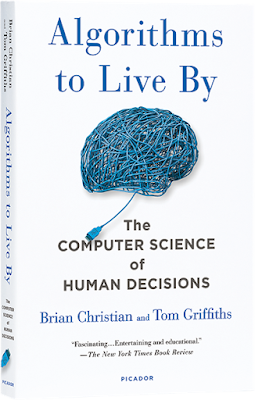I liked the idea of the book form the first time I've seen the title and fortunately, it lives up to my expectations. It's not perfect, but it rekindled my curiosity towards math and algorithms. Bringing them to everyday problems makes them much more interesting. The only thing that I'm missing in the book is the application of algorithms in business settings. For example, when I mentioned this book Mateusz K he has sent me a blog post of Pieter Hintjens: Amdahl to Zipf: Ten Laws of the Physics of People . For example, Amdahl's Law mathematically proves the argument from The Mythical Man-Month that you can't just add new people to the project to deliver it faster because of the cost of synchronization. I want this post to be a reminder for myself of the most interesting ideas in the book so if you want to savor it yourself just remember that it's worth buying. Rating: 9/10 Contents: 1. Optimal Stopping Probably the most ...


